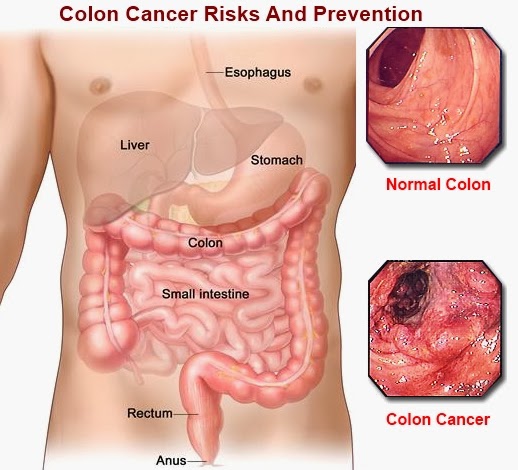Cancer: it’s not a word that anyone really wants to hear. While not necessarily a death sentence, cancer is an illness that does have a high mortality rate depending on where in the body it strikes.
Colon cancer
– the third most common cancer – results in the second highest number of cancer deaths. While that fact can be a bit intimidating, as can the realization that for many people colon cancer has no symptoms until it is in its advanced stages, it’s important to take a step back and recognize that there are a number of things that you can do in order to lower your risk of developing the disease.
Long before someone develops full blown colon cancer and notices symptoms like unexplained weight loss, anemia, generalized weakness and changes in bowel habits, there are screening procedures that can be performed by a doctor to check for signs of developing colon cancer as well as pre-cancerous polyps in the colon. Screenings are important – in fact, they are essential for detecting, diagnosing and monitoring colon cancer.
Ideally, if you were to develop colon cancer, and it would be caught before the tumor grew through the intestinal wall or soon after it had begun to do so, the treatment will often be successful, since this cancer is easy to treat if it is discovered in its early stages. Once the cells have invaded the lymphatic system or metastasized into other areas of the body, the chances of recovery begin to diminish significantly.
To ensure early detection
– in addition to screenings – it’s important to understand the risks and behaviors that can contribute to the disease (and to know what you can do to reduce your risk). Each of the following can contribute to your risk of developing colon cancer:
1. Age: as you get older, the risk of developing colon cancer increases;
2. History of cancer: if you have had other cancers, your risk increases; similarly, if you have a family history of colon cancer, your risk increases;
3. A history of other colon problems including Crohn’s disease;
4. Diet: many people don’t eat foods that are particularly healthy – or don’t eat enough of the foods that are not only healthy for them but are also beneficial to the digestive tract;
5. Smoking and alcohol: there’s been a great deal of focus on what smoking and excessive consumption of alcohol can do to harm the body, but it’s also important to note that the toxins from both also affect the colon.
6. Lack of physical activity: exercise not improves an overall sense of well-being but also helps the body to work more efficiently.
When you know what can contribute to the risk of developing colon cancer, you’ll find that there are more things that you can do in order to reduce your risk. While you cannot turn back the clock or change your family’s genetic history, you can make a commitment to getting more exercise and to changing your diet so that you’re taking in more fruits, vegetables and whole grains that are high in fiber and by reducing the amount of protein that you’re taking in.
Likewise, when you are more aware of things that can be toxic within the body – whether in your case it is eating overly processed foods, smoking or drinking – it becomes easier to make changes to limit the intake of them. For those who have trouble making the change, however, there is another option: colon cleansing.
Using a colon cleanser to rid the body of toxins, it can break down the unhealthy foods that the body does not easily process, and it can help to reduce demands on other organs in the body as well. When the colon and large intestine are working properly, there is less strain on the liver; when there are fewer demands on the liver the kidneys are better able to function and perform their essential tasks.
Colon cleansing, therefore, is not just about ensuring that your body is properly eliminating waste; it’s also about ensuring that your body is able to function properly and with less strain. By taking these steps – and by taking steps to increase your physical activity and care for your body – you’re likely to find that you are in better health overall.
Not all colon cancers are preventable and it’s important to recognize that. However, that doesn’t mean that you shouldn’t do what you can to reduce your risk of developing the disease. Care for your body, ensure that you’re eliminating toxins and take the time to have screenings for colon cancer and you’ll find that you increase your quality and longevity of life.








0 commentaires:
Post a Comment